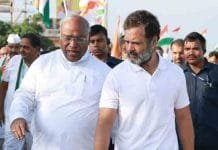The political turbulence surrounding Arvind Kejriwal, the former Chief Minister of Delhi and National Convenor of the Aam Aadmi Party (AAP), has intensified significantly. In a major development, Delhi’s Lieutenant Governor (LG) Vinay Kumar Saxena has given permission to the Enforcement Directorate (ED) to prosecute Kejriwal in the controversial Delhi Excise Policy case. This decision, announced after the ED’s request for prosecution approval on December 5, has further deepened the crisis for the AAP leader, drawing sharp political reactions.
AAP Calls Out BJP Over Allegations
AAP has vehemently opposed the allegations and accused the BJP of political vendetta. The party, in its counter-offensive, has demanded transparency from the ED and the LG. Delhi Chief Minister Atishi Marlena, addressing the issue, raised critical questions:
“If LG Saxena has indeed granted permission for prosecution, why is the ED withholding the copy of the approval? What is the motive behind spreading misleading news?”
Atishi’s statement reflects AAP’s stance that the allegations are an attempt to divert public attention from pressing issues and tarnish the party’s image ahead of key elections.
Legal Developments: High Court Hearing Scheduled for January 30
The legal battle is set to intensify as the Delhi High Court has scheduled a hearing for January 30, 2025, regarding Kejriwal’s plea challenging the ED’s actions. Represented by Justice Manoj Kumar Ohri, the court had initially planned to hear the case on February 19, but the date was rescheduled following Kejriwal’s counsel’s insistence on urgency.
Kejriwal’s legal team argued:
“With upcoming elections, this delay is unwarranted. The court must expedite the hearing to ensure justice prevails.”
Simultaneously, a similar plea by senior AAP leader Manish Sisodia, who also faces charges under the Delhi Excise Policy case, will be heard on the same date.
ED’s Argument and Sanction Controversy
The Enforcement Directorate, represented by Solicitor General Tushar Mehta, has maintained that all necessary sanctions for prosecuting Kejriwal were obtained. The ED assured the court of filing an affidavit to substantiate this claim. Kejriwal and Sisodia, however, have contested the ED’s position, asserting that the trial court’s cognizance of the chargesheet is legally flawed without valid sanction for prosecution.
This conflict over procedural legality raises critical questions about the integrity of the ongoing investigation and the ED’s adherence to established legal protocols.
The Core of the Delhi Excise Policy Case
The Delhi Excise Policy case revolves around allegations of financial irregularities and corruption in the implementation of the policy during Kejriwal’s tenure as Chief Minister. The ED claims that the policy was designed to benefit select private entities at the cost of public revenue. AAP has consistently denied these allegations, asserting that the policy was introduced to curb corruption and enhance transparency in the excise sector.
Key Allegations Against Kejriwal and AAP Leadership
- Unfair Favoritism: The policy allegedly favored certain liquor vendors, leading to revenue losses for the state.
- Financial Kickbacks: ED has claimed that illegal kickbacks were routed through intermediaries, with alleged links to top AAP officials.
- Lack of Sanctioned Process: Procedural lapses in policy formulation and implementation have been highlighted.
These accusations have formed the basis for the ED’s chargesheet, which is now under judicial scrutiny.
Political Implications of the Case
The case has far-reaching political consequences for Arvind Kejriwal and the Aam Aadmi Party. With elections looming, the allegations have provided opposition parties, particularly the BJP, with significant ammunition to target AAP’s governance model and credibility.
BJP’s Stand on the Issue
The BJP has repeatedly accused AAP of being deeply entrenched in corruption. In response to AAP’s allegations of conspiracy, BJP leaders have countered by demanding accountability and transparency from the party’s leadership.
A senior BJP spokesperson remarked:
“AAP’s claims of conspiracy are baseless. If they have nothing to hide, they should cooperate with the investigation instead of playing victim.”
Impact on Public Perception
For Kejriwal, who built his political image as a crusader against corruption, these allegations pose a significant challenge. Public perception of AAP’s integrity, particularly among its core urban middle-class voters, is at stake.
AAP’s Counteroffensive Strategy
AAP has launched a robust counteroffensive, seeking to mobilize public support and discredit the allegations.
- Transparency Demand: AAP has urged the ED to release all documents related to the case to expose the alleged “misinformation campaign.”
- Grassroots Mobilization: Party workers have been tasked with engaging the public to highlight AAP’s governance achievements and counter the BJP’s narrative.
- Legal Battle: AAP’s legal team is preparing a comprehensive defense to challenge the ED’s charges in court.
Atishi’s Bold Remarks
In a strongly worded statement, Atishi emphasized:
“BJP must stop its conspiracies and focus on governance. The people of Delhi are not fooled by such tactics.”
A Critical Turning Point for AAP
The outcome of this case will have a decisive impact on the future trajectory of AAP. As Kejriwal fights to clear his name, his party faces a critical test of resilience and public trust.
What Lies Ahead?
- Judicial Verdict: The High Court’s ruling on January 30 will shape the next phase of the legal battle.
- Political Ramifications: How AAP navigates this crisis will determine its prospects in the upcoming elections.
- Public Sentiment: The party’s ability to retain its image as an anti-corruption crusader will be pivotal.
















